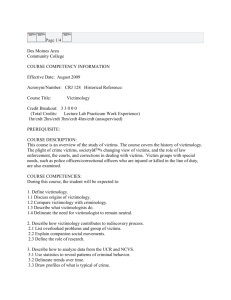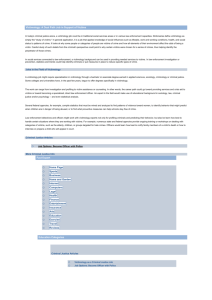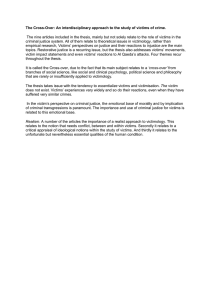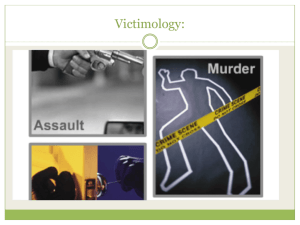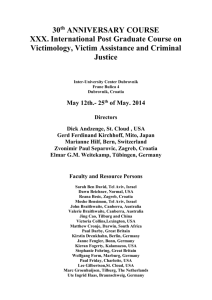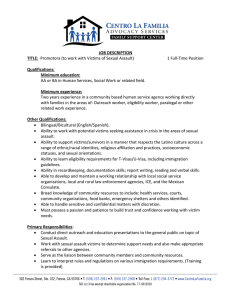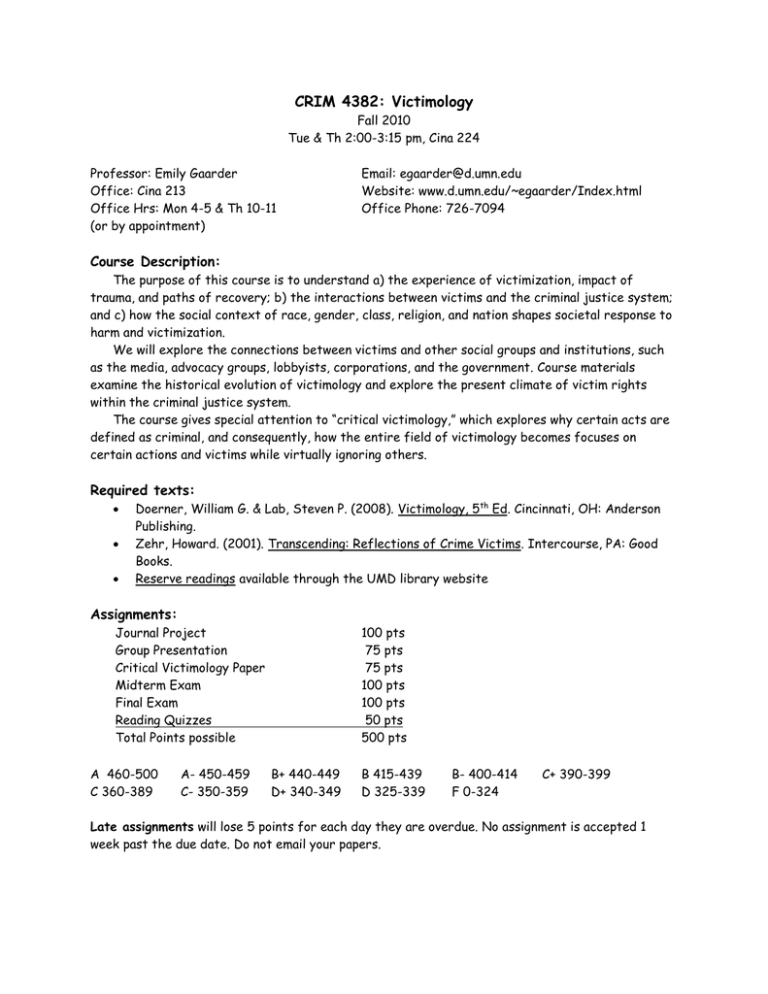
CRIM 4382: Victimology
Fall 2010
Tue & Th 2:00-3:15 pm, Cina 224
Professor: Emily Gaarder
Office: Cina 213
Office Hrs: Mon 4-5 & Th 10-11
(or by appointment)
Email: egaarder@d.umn.edu
Website: www.d.umn.edu/~egaarder/Index.html
Office Phone: 726-7094
Course Description:
The purpose of this course is to understand a) the experience of victimization, impact of
trauma, and paths of recovery; b) the interactions between victims and the criminal justice system;
and c) how the social context of race, gender, class, religion, and nation shapes societal response to
harm and victimization.
We will explore the connections between victims and other social groups and institutions, such
as the media, advocacy groups, lobbyists, corporations, and the government. Course materials
examine the historical evolution of victimology and explore the present climate of victim rights
within the criminal justice system.
The course gives special attention to “critical victimology,” which explores why certain acts are
defined as criminal, and consequently, how the entire field of victimology becomes focuses on
certain actions and victims while virtually ignoring others.
Required texts:
Doerner, William G. & Lab, Steven P. (2008). Victimology, 5th Ed. Cincinnati, OH: Anderson
Publishing.
Zehr, Howard. (2001). Transcending: Reflections of Crime Victims. Intercourse, PA: Good
Books.
Reserve readings available through the UMD library website
Assignments:
Journal Project
Group Presentation
Critical Victimology Paper
Midterm Exam
Final Exam
Reading Quizzes
Total Points possible
A 460-500
C 360-389
A- 450-459
C- 350-359
100 pts
75 pts
75 pts
100 pts
100 pts
50 pts
500 pts
B+ 440-449
D+ 340-349
B 415-439
D 325-339
B- 400-414
F 0-324
C+ 390-399
Late assignments will lose 5 points for each day they are overdue. No assignment is accepted 1
week past the due date. Do not email your papers.
Date
Reading
Tu, 9/7
Th, 9/9
Tu, 9/14
Class introductions
Th, 9/16
Tu, 9/21
Th, 9/23
Tu, 9/28
Th, 9/30
Tu, 10/5
Th, 10/7
Tu, 10/12
Th, 10/14
Tu, 10/19
Th, 10/21
Tu, 10/26
Th, 10/28
Tu, 11/2
Th, 11/4
Tu, 11/9
Th, 11/11
Tu, 11/16
Th, 11/18
Tu, 11/23
Th, 11/25
Tu, 11/30
Thu, 12/2
Tu, 12/7
Th, 12/9
Tu, 12/14
Th, 12/16
M, 12/20
Assignment Due
Doerner & Lab, Chap 1: The Scope of Victimology
Doerner & Lab, Chap 2: Gauging the Extent; and On Reserve,
“The Victim Rights Movement” by Beckett & Sasson
Zehr, “About This Book” & Stories 1-4
Doerner & Lab, Chap 10: Homicide
Zehr, Stories 10-13 & 16-21
Doerner & Lab, Chap 7: Intimate Partner Violence
Handout: Power/Control Wheel
Guest Speaker: Dom. Abuse Intervention Program & Safe Haven
Doerner & Lab, Chap 6: Sexual Battery
Film: The Date Rape Backlash
Journal #1 Due
Doerner & Lab, Chap 8: Child Maltreatment
Guest Speaker: 1st Witness Child Abuse Resource Center
On Reserve: “Disconnection” by J. Herman
Handout: DSM-5 Manual, PTSD
Exam review
Midterm Exam
On Reserve: “Special Victim Populations” by Wallace
On Reserve: “Hate Crimes” by Wallace
Film: Laramie Project
Film: Laramie Project
Doerner & Lab, Chap 4: Remedying the Plight of Victims &
Chap 12: Victim Rights
Guest Speaker: Victim Witness Services & Men as Peacemakers
Meet w/groups
On Reserve: “The Highs & Lows of Emotional Labor” &
Zehr, Stories 22-31, skip 23
Zehr, Stories 32-37 & Part II: pgs 186-197
On Reserve: “The Need for a Critical Victimology,” by Fattah
No regular class
Journal #2 Due
Meet w/groups
On Reserve: “Victims’ Rights as a Stalking-horse for State
Repression” by Wright
No class- Thanksgiving
Film: Taxi to the Dark Side
Film: Taxi to the Dark Side
Paper Due
Meet w/groups
Group Presentations
Group Presentations
Group Presentations
Group Presentations & Exam Review
Final Exam 4:00-5:55pm
Final Exam
ASSIGNMENTS
Journal Project: You will hand in a journal twice during the semester. Each is worth 50 points. The
journal might be a log of your reactions and insights on the topic covered in readings and lectures,
perhaps typing in it after each class or after conducting the readings. Alternatively, you can
reflect on what the class has caused you to think about, or things you are noticing around you due to
the class material. You can write about your personal experiences past or present. The journals
should not be a summary of the facts learned in the lectures or your lecture notes, but rather your
evaluation of what you’re learning, how what you are learning applies to your life, and what you think
is accurate or inaccurate, unique, and so on about the readings, lecture, videos, and guest speakers.
You can use the journal to critique and expand upon the readings. Entries may also take alternative
forms, including drawings, stories, artwork, poetry, and music. Make your journal a form of creative
expression.
It would be helpful to house your journal inside a folder or binder of some type, for ease and
organization. Try to choose something that is not too bulky. Minimize the use of plastic sheet
covers over papers, as they make it difficult for me to write feedback. For the journal aspects that
include words, please type them, and I prefer single or 1.5 spaced. Journals should equal
approximately 1 page per class period. They should cover up to the readings due the day the journal
is due. Please date your journals throughout so that I know to which week you are responding (i.e.,
what day you are typing each entry). To receive full points, they must include information on what
you learned in the readings. But don’t limit your journals to a simple rehashing of what you read.
Group Presentation: In groups of 3-4 students, you will create a 15-20 minute presentation on some
aspect of “Critical Victimology.” Your aim is to explore the wider social context in which some
versions of “victims” or victimology receive more attention than others, including policy responses
and service delivery. Your presentations should address the following:
1. Who is impacted by the harm
2. The scope and consequences of the harm
3. Why this harm has received less attention, or is not readily identified as involving victims or
victimization
4. The type of support the victims have received, and by who or what organizations
5. Ideas for resources/support that have not yet been addressed
6. Who you think could share in responsibility of repairing harm or supporting the victims
7. How your topic relates to any class readings, guest speakers, and/or films
8. The sources of your information should be cited throughout.
All group members will receive approximately the same grade on the presentation, but there may be
some variation based on individual contributions and quality of the presentation.
Suggested topics include the victims/survivors of:
Sexual abuse by Catholic priests
Hurricane Katrina
Abu Ghraib/ Guantanamo
Wrongful conviction/death penalty cases
Environmental crimes
Financially-based corporate crimes (e.g., Enron)
BP Oil Spill
Sexual/physical abuse while incarcerated
Domestic violence within military families
Genocide
Police brutality
War crimes
Critical Victimology Paper: This 4-5 page paper will be a reflective essay on critical victimology.
Using the class readings, lectures, and discussions, you will examine the social context in which some
versions of “victims” and “crimes” become more dominant. You will choose specific examples to
illustrate this social phenomenon, analyzing whose interests are served or not served in this version
of victimology. If you would like to improve your writing/revising/editing skills, I strongly suggest
utilizing the free writing services at the Solon Campus Center. Call 726-6246 for an appointment,
or visit their website at (www.d.umn.edu/tutoring/) for available times. Bring a draft of your paper,
and a copy of the writing assignment.
Exams: The in-class exams will be multiple choice, short answer, and essay format, based on class
readings, films, guest lectures, and class lecture/discussions.
Reading Quizzes: Quizzes given at the beginning of random class meetings are designed to assess
your general comprehension of the material. There are no make-up quizzes, but I will drop your two
worst quiz scores from your final total. You may use extra credit opportunities to make up points in
this category. I will announce events occurring outside of class that you can attend for E.C. Type a
2 page written reflection on the event, to equal one quiz (5pts).
Attendance & Participation: In the event of borderline grades at the end of the term, I will take
note of students who had regular attendance and meaningful participation in class (e.g., round an
“A-“ up to an “A”).
Academic Integrity
Cheating, plagiarizing or other actions that violate the rights of another student in academic work
or involve misrepresentation of your own work are violations of academic integrity. The American
College Dictionary defines plagiarism as “copying or imitating the language, ideas, and thoughts of
another author and passing off the same as one's original work.” If you are confused as to the
difference between paraphrasing and plagiarizing, ask for clarification! The correct way to
paraphrase (explain an author’s point in your own words) is to place the author’s last name & the
date of publication after your sentence. Examples of the correct use of paraphrasing and quoting:
Vandana Shiva calls food democracy “the new agenda for ecological sustainability and social
justice” (Shiva 2000, p. 18).
Regardless of age, political views, and educational level, women are more likely than men to
be animal advocates (Kruse 1999).
UMD’s Academic Integrity Policy can be found at: www.d.umn.edu/assl/conduct/integrity
Students with disabilities
It is the policy and practice of the University of Minnesota Duluth to create inclusive learning
environments for all students, including students with disabilities. If there are aspects of this
course that result in barriers to your inclusion or your ability to meet course requirements – such as
time limited exams, inaccessible web content, or the use of non-captioned videos – please notify the
instructor as soon as possible. You are also encouraged to contact the Office of Disability
Resources to discuss and arrange reasonable accommodations. Please call 218-726-6130 or visit
the DR website at www.d.umn.edu/access for more information.
THE SENSITIVE NATURE OF THIS COURSE
It is important to understand that many, if not most students who’ve taken this course in the past
find some aspects of it emotionally difficult. Reading and hearing about victimization and trauma
can be very hard. Should you decide during the semester that information about options for your
individual or another person’s circumstances would be appropriate, there are many services available
on and off campus. I’ve listed these services on the last page of the syllabus.
Sometimes students want to ask questions that they fear are “stupid” or “offensive.” I don’t want
this concern to limit learning. If you have a question you are uncomfortable bringing up during
class, or want to check with me about before you bring it up during class, please feel free to ask me
on e-mail or during my office hours. If I think it is inappropriate, I will tell you, but chances are it
is not inappropriate and other students may have the same question or benefit from a discussion of
it. Sometimes students tell me “I don’t want to ask this question during class or make this point,
but could you?” If I agree that it would be useful for the class, I am happy to bring the issue or
question up myself (without giving the student’s name). To create a safe learning environment,
please honor the following guidelines:
Never ask another student in the course if s/he has been a victim or is a survivor. While it
is up to individual students as to whether they choose to discuss their own experiences in
class, it is inappropriate for anyone to ask another person if s/he has been raped, sexually
exploited, battered, stalked, or violated/abused in any other manner.
Never request that another student in the class speak on behalf of a group (e.g., African
Americans, Jewish People, Latino/as, Asian Americans, men, women, lesbians/gays, etc.)
Be considerate and respectful of all the members and guests of this class. This includes
being mindful of your spoken and body language (facial gestures, whispering, making
comments under your breath). Please refrain from using any forms of technology (e.g., cell
phones, laptops) in class, unless you are meeting for group presentations.
UMD SUPPORT SERVICES
Counseling: Call 726-8155 for an appointment or visit (www.d.umn.edu/hlthserv/counseling)
Consider seeking counseling if you are:…Searching for ways to cope with college life, having conflicts with
roommates, co-workers, friends, feeling lonely, inadequate, or having trouble "fitting in", questioning the
course of romantic relationships, concerned about your sexuality, dealing with difficult family situations,
feeling tense, stressed, anxious, irritable, or uncertain, experiencing a lack of motivation or ability to
concentrate, concerned about alcohol or drug use, dealing with eating problems, experiencing difficulty grieving
about a loss, experiencing sexual harassment or other kinds of discrimination, dealing with a crisis such as
sexual assault or rape, recovering from sexual or physical abuse or incest (excerpt from the UMD counseling
website).
Campus Police
287 Darland Administration Building
Care for victim, transport to hospital, investigate, follow-up
726-7000
Women's Resource and Action Center (WRAC)
193 Kirby Student Center (UMD)
Support, advocacy, provide information on options, referral
726-6292, 726-8444
COMMUNITY SUPPORT SERVICES
Program for Aid to Victims of Sexual Assault, 218-726-1442
(PAVSA) Advocacy for sexual assault and incest survivors, 24-hour Crisis Line
218-726-1931
Lake Superior Regional Family Justice Center
414 East 1st Street
Duluth, MN 55805
(218) 623-1000
A “one-stop” shop for battering victims and their children. Offers women's groups, individual counseling, court
advocacy, assistance with a protection order or with criminal court process
Center against Sexual and Domestic Abuse, (CASDA), Superior, WI
Support and advocacy for battered women and sexual assault victims, emergency housing, 715-392-3136, 1800-649-2921
Safe Haven, Duluth
Shelter for battered women and their children
218-728-6481, 1-877-880-3094, 218-730-2464
Miller-Dwan Hospital 24-hour Crisis Line, 218-723-0099
Mental health needs

